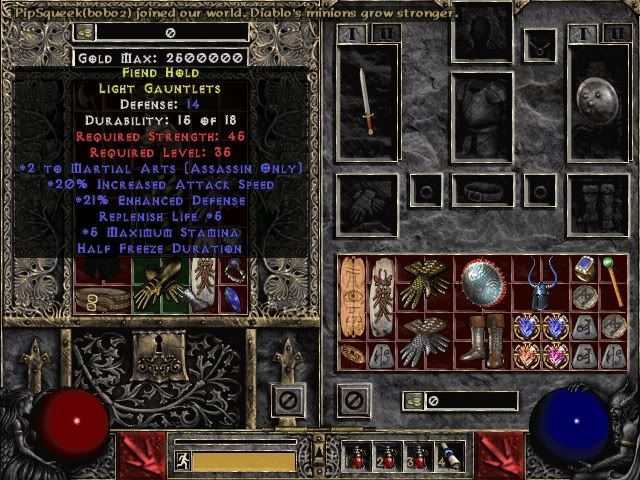
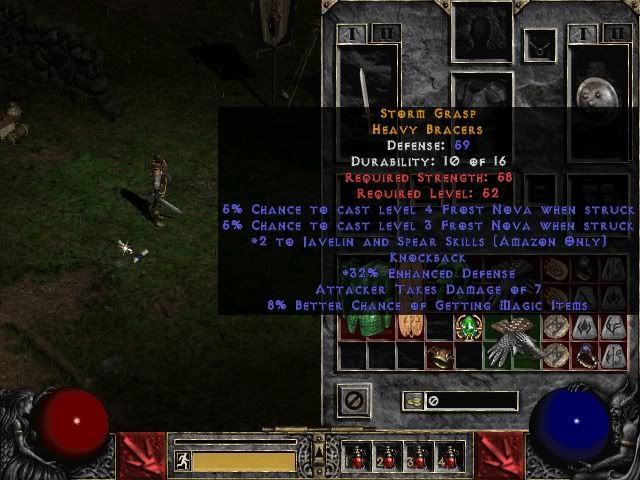
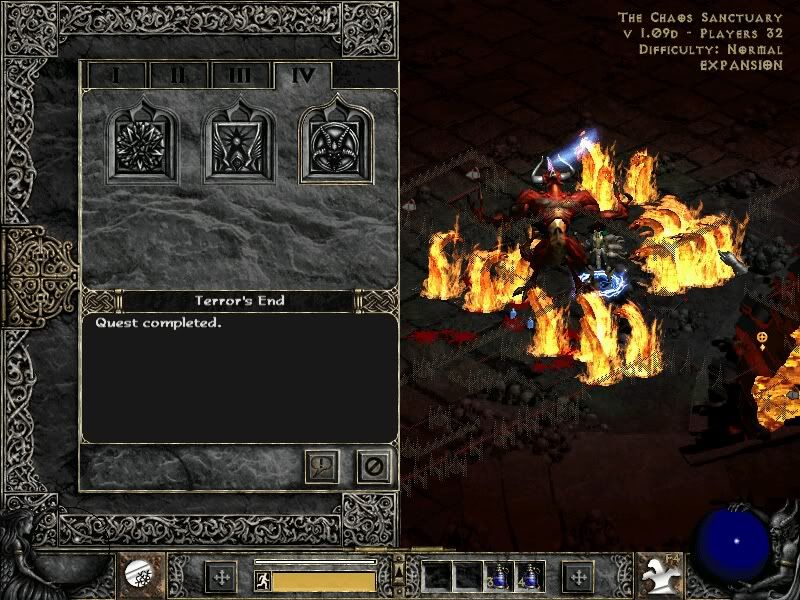
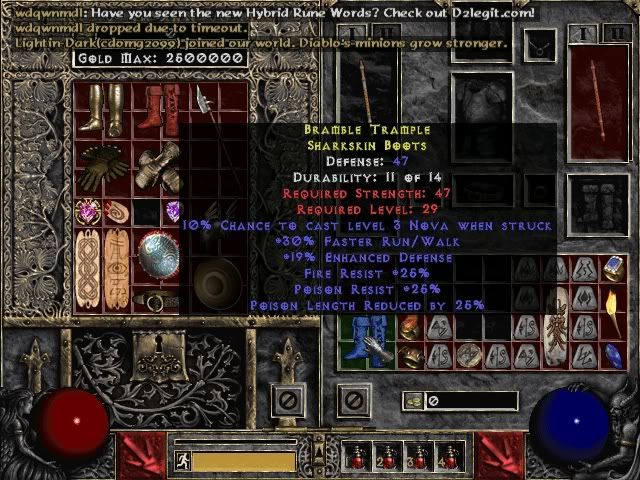
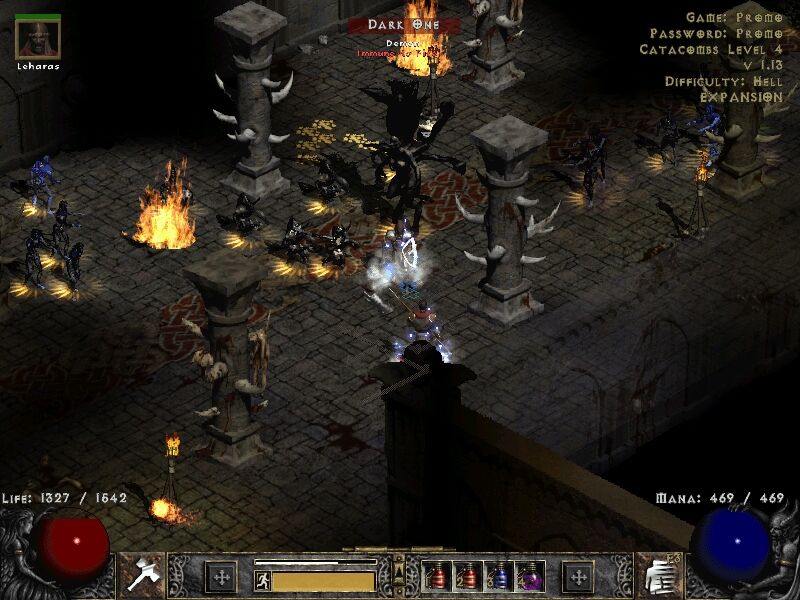
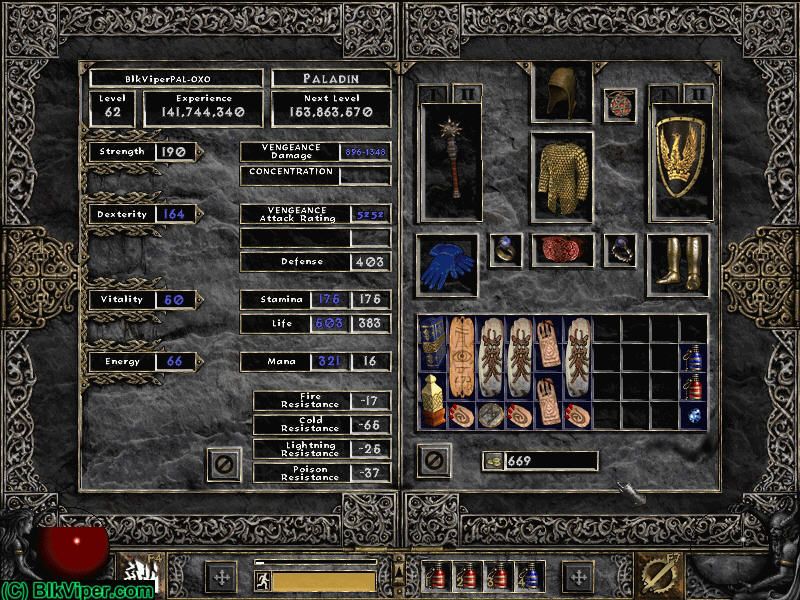
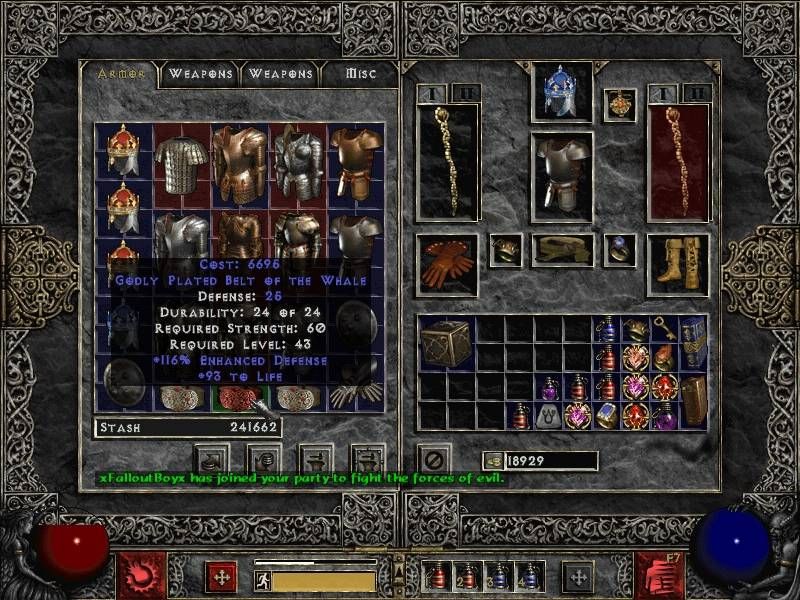
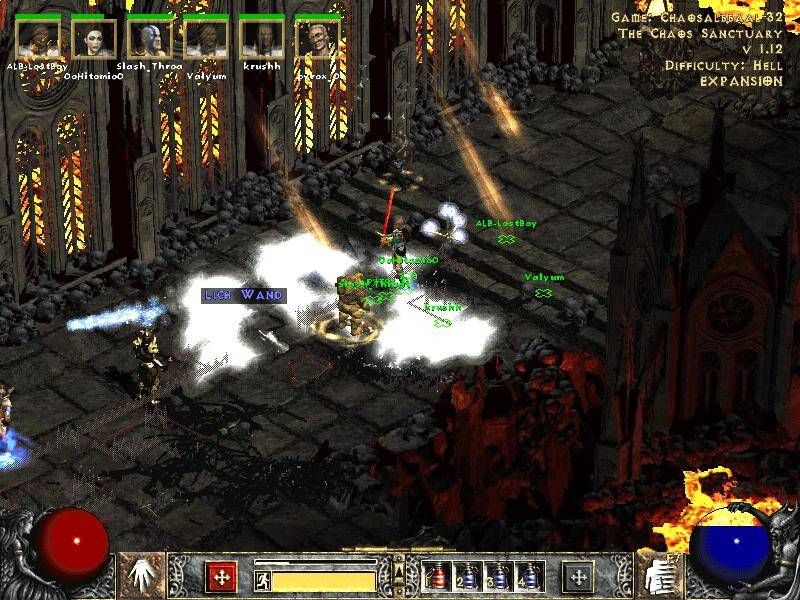 iii
iii25: Suikoden II:

Kicking off the list is a title that most RPG fanatics will probably recognize, even though it doesn’t have the immediate name recognition that some of the other titles enjoy. Developed by Konami and masterminded by Yoshitaka Murayama, the Suikoden series sets itself apart from its PlayStation era contemporaries with its deep RPG systems, strategic combat, and sprawling fiction. Each entry features the “108 Stars of Destiny”, which in most entries means 108 distinct party members. That’s pretty impressive by any standards. While the franchise is chock full of great games, Suikoden 2 probably shines the brightest. Unfortunately, it’ll take some good luck getting a copy these days.
24. Jade Empire:

It’s no secret that the phrase “Role-Playing Game” is synonymous with a fantasy setting featuring Wizards, spells, enchanted items, and dungeons to crawl.
However, this was not the case with Jade Empire, a game that manages to forgo all cliches in favor of embracing an entirely new and unique setting in a kung-fu adventure feeling like something ripped straight from Crouching Tiger, Hidden Dragon.
It didn’t necessarily have the most in-depth skill-building system, but what it lacked in depth it more than made up for in storytelling and unique counter-based combat. Jade Empire was an engrossing and engaging experience more than deserving of a spot on the list of the top 25 RPGs of all time.
23. Kingdom Hearts II:

Talk about taking a unique conception and improving on in it just about every aspect. The original Kingdom Hearts was such a weird but satisfying game. Seeing Disney favorites on the same screen as Squall, Cloud, and Sephiroth was a sight to behold. With the sequel, Square-Enix managed to take all expectations the first one had (and any the sequel conjured up) and shattered them all. The gameplay was much smoother, the graphics were better (no more barbie lips on Sora), the Drive system kept combat fresh, and the story took a turn for the interesting.
Kingdom Hearts 2 really made the series stand out and become a favorite among RPG fans. It was because of this sequel that the series is still successful and has so many more games out there. Even for fans who don’t play the non-numbered games, they’ll still be extremely excited for Kingdom Hearts 3 because of this game.
22. Dragon Age: Origins:

Stepping out of Dungeons & Dragons’ shadow, BioWare created one hell of a world and lore with Dragon Age. This modernization of the Baldur’s Gate gameplay brought together strategic gameplay, intense story, engaging characters, plenty of customization, and lore you could sink your teeth into for days at a time.
Dragon Age successfully took a mastered formula that once only belonged in the Forgotten Realms and brought it to the rest of the gaming world. No longer was this kind of gameplay put aside for its ties to D&D or being labeled as too hardcore to play. For that, and how epic the game actually was, Dragon Age: Origins needs to be commended.
21. Phantasy Star IV:

It’s hard to argue the inclusion of this classic gem on this list. Phantasy Star was one hell of an RPG series before evolving into the online hit on the Dreamcast. Even though it was a big hit with the RPG games back during the Genesis era, the series really hit the spotlight with the fourth entry to the series.
Phantasy Star IV featured engaging characters, a frantic and intense storyline, and an unforgettable experience. It was one of the earliest examples of an RPG being amazing across the board in gamplay, story, design, characters, and soundtrack.
20. Wild ARMs:

Another excellent PlayStation era RPG, Wild ARMs is basically Firefly before Firefly was a thing. Blending modern technology, monsters and magic with a Western motif made for a compelling universe, and Wild ARMs brought the gameplay chops to back it up. Each of the three characters have individual tools and skills that assist in solving the excellent puzzles and defeating the often jaw-dropping enemies you encounter throughout. Whether it be Rudy’s titular ARMs, Cecilia’s magic creation system or Jack’s sword techniques, each character brings a unique skill set to the group, and the game ends with one of the more dramatic twists in gaming. Wild ARMs spawned a number of quality sequels, but never really earned the success it deserved.
19. Disgaea: Afternoon of Darkness:

If you asked me what RPG contained the most content, I would answer with Disgaea: Afternoon of Darkness. This is a game with a serious amount of depth that manages to not take itself seriously at all. The story, setting, and character make for some of the quirkiest in games, but you’ll be hard pressed to find a game series that gives you this much to do, find, and conquer.
Afternoon of Darkness is the definitive version of the first Disgaea and it was this game that really took the strategy and RPG combination to its limits. Your characters have levels, your items have levels, there are story dungeons, side dungeons, and your items even have dungeons. You can’t turn around without finding something to do in this game.
It isn’t just the content that really gives Diagaea the credit for being on this list, though. Disgaea features some of the best things Final Fantasy Tactics had and improvements to help this combo of genres become a very popular one. Tactics may have come first, but Disgaea opened the flood gates for potential.
18. Persona 4 Golden:

It takes a lot to have a game that will encompass all of your time and thoughts while completely engrossing you in the experience. While Persona 4 Golden isn’t the only game like that on this list, it is the most recent.
Even though the original came out in 2008, Golden adds a lot to the game even for previous players to come back and play through again.
What makes P4G so amazing is how much you care for the cast of characters and what they are going through. You do something in this game that you don’t do in any other. You have to help the characters face their true selves and come to terms with their feelings. You have to help them all see the truth and harness that into power. It is through this truth that the main character and his friends are able to combat those who would hide the truth forever.
P4G takes you inside the minds of a game’s characters and even makes you wonder about yourself and the truths you ignore. That’s a powerful thing for a game to do, making it one of the most impressive games seen in years.
17. Dark Cloud:

An early of example of the brilliance developer Level 5 would come to be known for, Dark Cloud showed that the RPG genre still had plenty of room for innovation. While the story wasn’t exactly a masterpiece and the randomized dungeons could become a little repetitive, Dark Cloud earns mad points for its intricate player and weapon leveling systems, unique combat and, most importantly, its blending of sim elements into the game. Throughout the adventure, the player collects a resource named Atla which is used to rebuild the world in a manner of the players choosing, reminiscent of the SNES cult classic ActRaiser. It wasn’t perfect, but Dark Cloud scratched an itch most of us didn’t even know we had.
16. Dragon Quest VIII:

There’s so much you could pull from Dragon Quest for this list but ultimately VIII felt like the jump the series needed to once again hit the spotlight. Before this game it almost felt like the series was growing dull. But when you have an entry being talked about more than Final Fantasy X and many other RPGs that graced the PS2 at this time, you know you have a winner on your hands.
Featuring the classic art from Akira Toriyama, Dragon Quest VIII shattered fan’s expectations and churned out one of the best experiences on the PS2, which is quite a feat considering how many there were on the console.
15. Baldur’s Gate II:

You can’t include anything from Dragon Age or Knights of the Old Republic without giving a nod to the big guy that came before. Baldur’s Gate, and really everything from Forgotten Realms at this time, was instant gold to fans. Whether it was this series, Icewind Dale, Temple of Elemental Evil, or Neverwinter Nights, Baldur’s Gate managed to always come up in conversation and it is one of those rare titles that is automatically re-installed whenever you mention it.
The iconic gameplay, party management, character creation, and experience would be replicated over and over again and evolved many times over the years. From Neverwinter Nights to Knights of the Old Republic to Dragon Age, Baldur’s Gate’s legacy lives on as a genre definer and an example of masterful RPG combat and storytelling.
14. EarthBound:

Known as Mother in Japan, EarthBound achieved a devoted following before it ever released in North America. Despite a successful port of the second game in the series, most U.S. gamers know protagonist Ness more from his Smash Bros. appearances than the series he spawned from. However, those who have played the game got to experience one of the most unique RPGs ever created. A far cry from the sword, magic and monsters motif of most RPGs of the time, EarthBound featured clever and original characters, interesting physic components and writing that is far deeper than the standard RPG fare. Numerous theories have been set forth about the unusual ending, but like any good story, EarthBound makes you think without giving away all the answers. Simpy put, EathBound is one of the best narratives in gaming.
13. Final Fantasy Tactics: The War of the Lions:

While strategy RPGs are common, it’s hard to find one nearly as refined and as well developed as that of Final Fantasy Tactics. With a complex leveling system and the ability to assign new jobs to party members, Tactics takes customization to a new level, allowing players to build their party in nearly any way they see fit to do so. On top of that, the battle system is engaging and requires a fair amount of skill and strategy in order to be successful, and it manages to maintain the same depth of narrative seen in the many other games in the Final Fantasy franchise. It’s a definite beacon in the Strategy RPG genre, and one that simply shouldn’t be overlooked.
12. Super Mario RPG: Legend of the Seven Stars:

A game that tends to get oberlooked both in Nintendo and Squares catalog, this seemingly strange mashup won gamers over with its interesting combat, well-written dialogue and surprisigly well-fleshed out world. I’m going to go ahead and say it: Super Mario RPG features the best iteration of the Mushroom Kingdom ever. Period. The active battle system, which tasks players with entering timed button presses to boost their attack, magic and defense, makes the combat some of the best of its time, while the Mario license help bring in a number of people who might never have played an RPG before. Add in a well-done soundtrack and a quirky, off-beat sense of humor that totally hit the mark, and Super Mario RPG is a cult favorite that helped bring RPGs into the mainstream.
11. Final Fantasy VII:

What can be said about Final Fantasy VII that hasn’t been said already? One of the best known RPG ever, Final Fantasy VII cemented Final Fantasy as the leading name in RPGs, and proved that the PlayStation was for real. What exactly makes FFVII so loved? It’s hard to pinpoint.
Maybe it’s the excellent cast of characters. Cloud remains of the most popular protagonists ever, and the people that gather around him move the story forward in myriad interesting ways.
Or, it could be the refined role-playing mechanics. Materia is still one of the best magic systems in the genre, and the vast world, many secrets, and refined combat hit on all the high spots a good RPG needs to have. Or perhaps it’s all because Sephiroth is hands down one of the best antagonists ever. Whatever the reason, Final Fantasy VII is one of the most loved games ever, and this list simply wouldn’t be complete without it.
10. The Elder Scrolls V: Skyrim:

While many games throughout history have promised total player freedom, few have embraced it in the way Bethesda did with Skyrim. From the lonliest of towns to the grandest of mountains, nothing is out of reach in Skyrim, and few games have ever been able to capture a fraction of the breadth that game features. Skyrim is one of those rare games that never play the same way for any two people, and swapping stories of your experiences in Skyrim like war tales has become something many fans are wont to do. Add to that its ability to become a cultural phenomenon and inspire many various memes and inside jokes, and you’ve got a pretty compelling case to say that Skyrim is a modern fantasy masterpiece.
9. Fallout 3:

War. War never changes, and neither does Bethesda’s legacy of making fantastic and immersive RPGs.
Making the jump from an isometric view to a fully-realized first-person perspective isn’t something many games manage to do gracefully. Not so, however, with Fallout 3. The game took to the new approach well, embracing the feel of an FPS and complementing it with a unique environment and battle system that made up for somewhat wonky combat.
But it’s not the mechanics or the perspective that make Fallout 3 so great. Rather, it’s the atmosphere the game had and the story it told. In a market littered with post-apocalyptic games, Fallout 3 manages to still feel completely different and unique in the tone it sets and the world it creates. There’s depth to the game’s lore, fascinating characters to meet, and an amazing sense of the world that no other game has been able to re-create on the same level. It’s been a genre-defining game of the past generation, and for that, it’s more than deserving of a spot in a list of the greatest RPGs of all time.
8. Diablo 2:

There are some games that stick with you for some time and then there’s Diablo 2. I’ve been playing this game since 2000 when I secretly installed it on every computer in my grade school. No matter what class I was in, if we had computer time, I was slaying demons and not caring at all where I put my skill points. Later on I got really into builds and coming up with some great characters. It was all about reaching Hell difficulty and just being able to survive the Den of Evil. My Hammerdin and I really laid the smackdown from the Highlands to Arreat Summit for a long time.
Diablo 2 is another one of those games that someone reinstalls whenever they hear about it. It’s an experience that sticks with you and defines an entire genre. Hell, most of the games that released after Diablo 2 that resembled it were called “Diablo clones”. That says something. Blizzard hit all of the right points with Diablo 2 and the fact that it is still played worldwide today shows how great its legacy is.
7. World of Warcraft:

MMOs aren’t for everyone, but they can give you some of the most dynamic experiences in gaming. World of Warcraft is not only the biggest RPG on this list, it is also played monthly by over 10 million people worldwide. After four expansions and untold amounts of patches and updates, WoW has transformed massively from what it used to be back in 2004-2006 before Burning Crusade released.
Back during Vanilla WoW, I still remember running the Primordia guild on Arygos and raiding Molten Core, Onyxia’s Lair, and Blackwing Lair every week with 39 other players. That game gave me some of the most epic moments in my gaming career. Watching my guildmates and I take down Ragnaros for the first time was not only a sight to see but it was an accomplishment I’ll never forget. Even later on down the line in Wrath of the Lich King, just going through the whole Icecrown Citadel and fighting against The Lich King is something I’ll always look back on.
World of Warcraft gives players the opportunity to see and do things you never thought possible. Because of that, it is hard not to think of this game as one of the best RPGs of all time. It offers the most content of any RPG, and the experiences you can have in it are unparalleled.
6. Pokemon Crystal:

At a time when Pokemon was really hitting its stride in the popularity train, Pokemon Crystal became the definitive version of its generation and continues to be one of the best Pokemon games ever made.
It took all of the amazing elements of Red, Yellow, and Blue and completely re-imagined them in all the right ways. On top of that, it also introduced a plethora of new Pokemon, Dark and Steel-types, boasted 16 gym badges, 2 Champions, Suicune, and featured moving sprites that set the bar for the other Pokemon games going forward. It not only raised the bar for Pokemon games back in its early days on the Game Boy Color, it also paved the way for their continued existence today. Being that the Pokemon games are some of the most popular on handheld devices, we felt this had to be included in the top ten games of this list.
5. Star Wars: Knights of the Old Republic:

Before this game there was very little Expanded Universe content in Star Wars games that didn’t involve a Skywalker or Solo. When Knights of the Old Republic was released, fans were able to depart the Rebellion Era (and part of the New Jedi Order Era) and go back in time to when Luke and Vader would be considered weaklings next to the force wielders in the Old Republic Era.
Aside from the lore aspect, Knights of the Old Republic was basically an evolution of the Baldur’s Gate-like gameplay that was very popular in the 90′s and early 2000′s. But this time, we controlled a main character we built from scratch to figure out his past and why he was so important to the survival of the Jedi Order and the Republic.
Knights of the Old Republic offers players one of, if not the most, highly regarded plot twists ever. Its story is nigh impossible to beat in terms of the emotion that rushes through you when you reach the climax of the game.
4. Final Fantasy VI:

Newer gamers may not understand why we speak of Final Fantasy with such reverence, but FFVI is a perfect example of why it was,at one time at least, the premiere name in RPGs. It does so mnay things right that it’s almost hard to find fault with it. Each character in the huge roster brings something unique to the team, and they elevate the story far above what most games offer. The Esper system is an incredibly addictive way to level your players and magic, and the insane number of sidequests and secrets ensure that even the most dedicated of gamers will never run out of content, and the game is literally packed with moments that would be the high point in most other games: the opera scene, the creepy Ghost Train and the destruction of the entire world are just a few of the incredible watercooler moments the game offers, not to mention Kefka, one of the most delightfully mad antagonists seen in gaming. Final Fantasy VI isn’t just one of the best RPGs you can buy, it’s one of the best games ever made.
3. Secret of Mana:

An often criminally overlooked game in Square’s stellar catalog, Secret of Mana was doing things on the SNES that the genre wouldn’t fully embrace until years later. The real-time combat was light years ahead of the boring turn-based system that still hasn’t been completely phased out. Not only could your characters level up like in any good RPG, but your individual weapons and magic could level up as well, and took on new abilities by doing so. The art style was unique and beautiful, and is backed by one of the most stunning video game soundtracks of all time. If it only featured a better story, it would have a legitimate shot at number one, but as is it remains one of the best-aging RPGs on the list, and is a testament to the fantastic design prowess of its all-star cast.
2. Mass Effect 2:

Few games in history have ever been able to capture the magic of Mass Effect. From the story to the mechanics, the series is comprised of some of the greatest games ever made.
But it was Mass Effect 2 that realized the series’ potential to its fullest, building on the decisions made by the player and the expansive universe backing the franchise and creating a veritable masterpiece complete with impressive set pieces, fluid gameplay, great presentation, and well-paced storytelling. Mass Effect 2 is the best entry in a series that has helped define this generation and has capitalized on all the most important conventions of a great RPG. For that, it’s one of the best RPGs ever made.
1. Chrono Trigger:

What makes a great RPG? That’s the question at stake here. It’s why this list is here in the first place. It wasn’t easy establishing the exact criteria, but there are a few common factors that most people can agree on. Fun combat, solid levling systems, a good narrative and an artistic audio/visual experience seem to be givens, but we also took into account characters, innovation, the lasting legacy of the game and intangibles as well. On all these counts, Chrono Trigger knocks it out off the park. The unique dual and triple technique system rewards you with distinct attacks for every combination of characters, gives each party layout a distinct feel, and each has a slew of abilities waiting to be experimented with. The branching story and myriad alternate endings are as well-told as they are numerous, and trying to find them all is half the fun. Throw in a memorable art style and a top-notch orchestrated soundtrack and you have a complete game experience that is second to none. Chrono Trigger has everything you could want in an RPG, and is our choice for the greates role-playing game ever made.
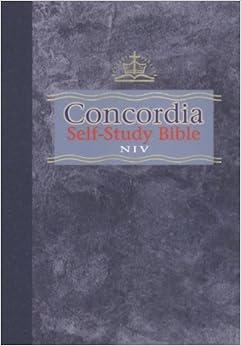






 I haven't done a full watch-through of the entire show more or less
since it ended in 1999, so it was a pleasure to go back, especially
given that I'm quite a bit older now, and better able to appreciate its
virtues. While I have enormous affection for both The Original Series and The Next Generation, DS9 easily wins the contest when it comes to best Star Trek
series. Building on the strengths of its predecessors (and taking
advantage of a studio distracted with the launch of a new network) this
series found its voice by being very, very different from what came
before, without ever radically deviating from the basic tenets of the
most imperative Star Trek motifs. In the process, we got the
best - and best developed - ensemble, a stunningly well-realized and
enormous supporting cast (including the best villains the franchise had
since Khan), a rich and complicated mythos in the villainous Dominion,
the first true serialization Trek fans ever witnessed, and the
pushing of moral boundaries and the questions they raise even farther
than its predecessors. Not only does this show demonstrate why I love Star Trek and why I love science fiction, it's also a great example of why I love television.
I haven't done a full watch-through of the entire show more or less
since it ended in 1999, so it was a pleasure to go back, especially
given that I'm quite a bit older now, and better able to appreciate its
virtues. While I have enormous affection for both The Original Series and The Next Generation, DS9 easily wins the contest when it comes to best Star Trek
series. Building on the strengths of its predecessors (and taking
advantage of a studio distracted with the launch of a new network) this
series found its voice by being very, very different from what came
before, without ever radically deviating from the basic tenets of the
most imperative Star Trek motifs. In the process, we got the
best - and best developed - ensemble, a stunningly well-realized and
enormous supporting cast (including the best villains the franchise had
since Khan), a rich and complicated mythos in the villainous Dominion,
the first true serialization Trek fans ever witnessed, and the
pushing of moral boundaries and the questions they raise even farther
than its predecessors. Not only does this show demonstrate why I love Star Trek and why I love science fiction, it's also a great example of why I love television.
 This game gets a lot of credit for its music and multiplayer, and
both are well-deserved. The soundtrack is noted for getting a Grammy
nomination (first ever for a video game), and no doubt about it, the
anonymity of the co-op is something special. But the one factor of this
game that sticks out to me in the most memorable way is its final
moments. After trudging through the wind and snow and finally
collapsing, your nameless protagonist is revived, given an enormously
long scarf, and thrust up past all the leviathans to the crest of the
mountain - a reward for making it as far as you did. The final level is
pure joy: with the long scarf and the water made of magic, you
essentially just fly up and up and up ever higher, while the music
swells into its best, most emotional theme of the entire game. And
walking through that bright light into the heart of the mountain, with
an end that is also a beginning, the game shows you why it is so aptly
named Journey.
This game gets a lot of credit for its music and multiplayer, and
both are well-deserved. The soundtrack is noted for getting a Grammy
nomination (first ever for a video game), and no doubt about it, the
anonymity of the co-op is something special. But the one factor of this
game that sticks out to me in the most memorable way is its final
moments. After trudging through the wind and snow and finally
collapsing, your nameless protagonist is revived, given an enormously
long scarf, and thrust up past all the leviathans to the crest of the
mountain - a reward for making it as far as you did. The final level is
pure joy: with the long scarf and the water made of magic, you
essentially just fly up and up and up ever higher, while the music
swells into its best, most emotional theme of the entire game. And
walking through that bright light into the heart of the mountain, with
an end that is also a beginning, the game shows you why it is so aptly
named Journey.
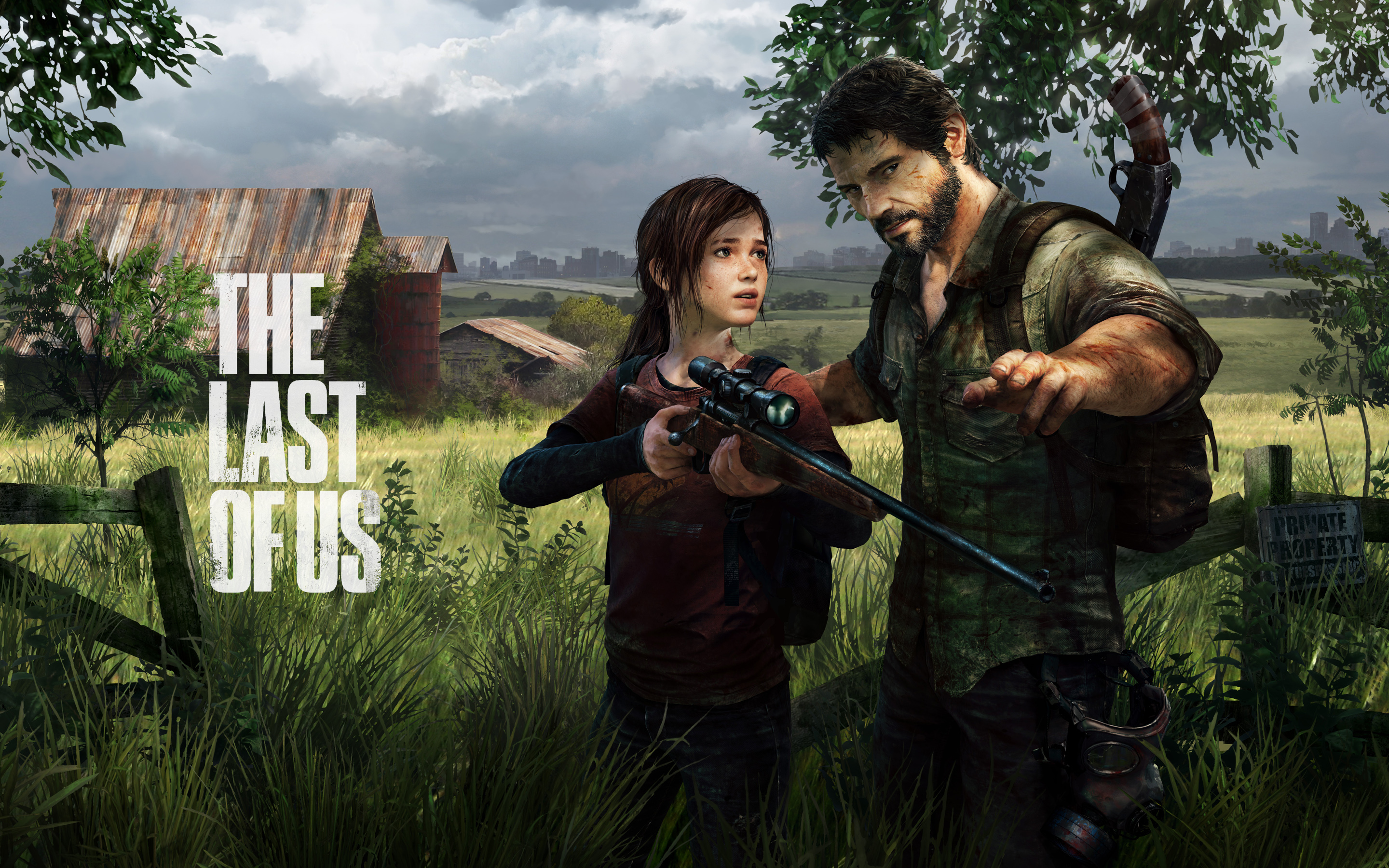 Have you ever found yourself reacting - no matter how subconsciously -
to the reactions of others regarding a game or a movie or a book? You
don't do it intentionally or willfully, or in any way mean-spirited.
But when you don't love it as much as others, then there reaches a
certain point when you find yourself saying, "It's good - but it's not that good"; until eventually, that pretty good experience you had is only okay. In retrospect, I think The Last of Us
was an okay game. I love Naughty Dog, and when it comes to developers
in the industry, they are definitely at the top. Heck, I even think
that narrative is very well structured. But unfortunately, it just
never emotionally connected with me. The two main characters -
especially Joel - were just unlikeable enough that I never
really engaged much in either (not like I have with, say, Nathan
Drake). And I never really bought into their relationship. Combine
that with the somewhat-too-similar-to-Children of Men story, and the fact that I kind of guessed at least part of the ending, and it just didn't register with me like it did others.
Have you ever found yourself reacting - no matter how subconsciously -
to the reactions of others regarding a game or a movie or a book? You
don't do it intentionally or willfully, or in any way mean-spirited.
But when you don't love it as much as others, then there reaches a
certain point when you find yourself saying, "It's good - but it's not that good"; until eventually, that pretty good experience you had is only okay. In retrospect, I think The Last of Us
was an okay game. I love Naughty Dog, and when it comes to developers
in the industry, they are definitely at the top. Heck, I even think
that narrative is very well structured. But unfortunately, it just
never emotionally connected with me. The two main characters -
especially Joel - were just unlikeable enough that I never
really engaged much in either (not like I have with, say, Nathan
Drake). And I never really bought into their relationship. Combine
that with the somewhat-too-similar-to-Children of Men story, and the fact that I kind of guessed at least part of the ending, and it just didn't register with me like it did others.
 Between this and Star Trek Into Darkness, I'm starting to sincerely believe that Hollywood has forgotten what science fiction actually is - and in its place, has been creating action films that take place in traditional science fiction settings. (Let's hope Jupiter Ascending and Interstellar
do better.) This wasn't necessarily a bad film, but it was a bit bland
- and that likely could've been fixed if it had actually stuck to its
guns when it came to the science fiction elements. To be an actual
in-depth examination of class disparity (and the probabilities of the
upper class creating something like Elysium) and using the sci-fi
elements to infuse them. But in the end, what it ultimately boiled down
to was a mano y mano between Matt Damon and Sharlto Copley By the end
of the movie, I was bored. And an hour after I walked out, I had
largely forgotten most of it.
Between this and Star Trek Into Darkness, I'm starting to sincerely believe that Hollywood has forgotten what science fiction actually is - and in its place, has been creating action films that take place in traditional science fiction settings. (Let's hope Jupiter Ascending and Interstellar
do better.) This wasn't necessarily a bad film, but it was a bit bland
- and that likely could've been fixed if it had actually stuck to its
guns when it came to the science fiction elements. To be an actual
in-depth examination of class disparity (and the probabilities of the
upper class creating something like Elysium) and using the sci-fi
elements to infuse them. But in the end, what it ultimately boiled down
to was a mano y mano between Matt Damon and Sharlto Copley By the end
of the movie, I was bored. And an hour after I walked out, I had
largely forgotten most of it.
 If there's a video game moment that I would add to my favorites list
from the year, this would be it. And I certainly wasn't expecting
something so affecting when I first booted up the game - especially
given that, at the outset, it starts roughly the same as the original BioShock.
Our first-person protagonist is out on the ocean and guided to a
lighthouse, which he enters, and is then transported to our
out-of-this-world city. But once Booker reaches the clouds, holy cow,
is it amazing! The color palette is stunning, the framing of the angel
on Monument Isle is gorgeous - giving us our first glimpse of Columbia -
the music is truly perfect in every way (both themes) and then the
exploration of the baptismal area with all the candles and quotes is
surprisingly serene. Now that is how you start a game!
If there's a video game moment that I would add to my favorites list
from the year, this would be it. And I certainly wasn't expecting
something so affecting when I first booted up the game - especially
given that, at the outset, it starts roughly the same as the original BioShock.
Our first-person protagonist is out on the ocean and guided to a
lighthouse, which he enters, and is then transported to our
out-of-this-world city. But once Booker reaches the clouds, holy cow,
is it amazing! The color palette is stunning, the framing of the angel
on Monument Isle is gorgeous - giving us our first glimpse of Columbia -
the music is truly perfect in every way (both themes) and then the
exploration of the baptismal area with all the candles and quotes is
surprisingly serene. Now that is how you start a game!
 This is not a bad film, by any means. I have a few minor criticisms
about its make, but no denying - Paul Greengrass knows how to make a
taut, tense thriller; and Tom Hanks has rarely been better. To say
nothing of how terrifying the situation is, especially one that imposes
upon an otherwise mundane sort of day; and the kind of heartbreaking
socioeconomic circumstances our antagonists come from, reminding us that
these pirates are very different from our romanticized pirates of old.
But unfortunately, given that these events only took place a couple
years ago, then it largely took away from the suspense. Much of the
film is built around wondering whether or not our title character is
going to die - but if you know the story (as many people do) then you
know not only that he lives, but how the final moments play out. It
really robs a story of its power when you know exactly where it's headed
and what the consequences are.
This is not a bad film, by any means. I have a few minor criticisms
about its make, but no denying - Paul Greengrass knows how to make a
taut, tense thriller; and Tom Hanks has rarely been better. To say
nothing of how terrifying the situation is, especially one that imposes
upon an otherwise mundane sort of day; and the kind of heartbreaking
socioeconomic circumstances our antagonists come from, reminding us that
these pirates are very different from our romanticized pirates of old.
But unfortunately, given that these events only took place a couple
years ago, then it largely took away from the suspense. Much of the
film is built around wondering whether or not our title character is
going to die - but if you know the story (as many people do) then you
know not only that he lives, but how the final moments play out. It
really robs a story of its power when you know exactly where it's headed
and what the consequences are.
 Oh, Agents of SHIELD. I still have faith in you. I'm still
holding out hope that you will be good - in spite of a somewhat
disappointing 10-episode start. There's still so much potential. But
after our mid-season break, I've never been more convinced: someone in
the main sextet needs to go. For whatever reason, it just isn't working
as is. And plenty of other series have shown us how much benefit can
be made when good characters are brought to the forefront (and bad
characters dropped by the wayside). While May and Coulson are the only
must-haves so far, it's really the trio of Skye, Simmons, and Fitz that
are proving the most annoying. And not just on an exclusive basis - we
can pretty well expect that from them week to week. Simmons should
stay, since she's demonstrated a great deal more maturity when
interacting with characters other than Fitz. Skye, meanwhile, is
vacillating between a manic pixie dream girl and a Mary Sue. And Fitz
is a willfully obnoxious 12 year-old (and saying so is a bit of an
insult to willfully obnoxious 12 year-olds), completely lacking in
self-awareness, and more annoying than fingernails on a blackboard.
Replace either with anyone more mature and more experienced, and it will
help escalate the entire experience.
Oh, Agents of SHIELD. I still have faith in you. I'm still
holding out hope that you will be good - in spite of a somewhat
disappointing 10-episode start. There's still so much potential. But
after our mid-season break, I've never been more convinced: someone in
the main sextet needs to go. For whatever reason, it just isn't working
as is. And plenty of other series have shown us how much benefit can
be made when good characters are brought to the forefront (and bad
characters dropped by the wayside). While May and Coulson are the only
must-haves so far, it's really the trio of Skye, Simmons, and Fitz that
are proving the most annoying. And not just on an exclusive basis - we
can pretty well expect that from them week to week. Simmons should
stay, since she's demonstrated a great deal more maturity when
interacting with characters other than Fitz. Skye, meanwhile, is
vacillating between a manic pixie dream girl and a Mary Sue. And Fitz
is a willfully obnoxious 12 year-old (and saying so is a bit of an
insult to willfully obnoxious 12 year-olds), completely lacking in
self-awareness, and more annoying than fingernails on a blackboard.
Replace either with anyone more mature and more experienced, and it will
help escalate the entire experience.
 It's difficult when you're watching someone adapt a text you're
attached to. I say this as someone who, by and large, still stands by
the notion of their inherent value. Almost anyone can point to an
example where it was screwed up - and you never want that to happen to
something you love. Ender's Game is not only one of my
favorite books, but I've watched people discuss its possible translation
into film for years now. And unlike Lord of the Rings, its
trailers weren't exactly promising. I've only seen it the one time; but
primarily, my response to it was a sense of relief. It wasn't the most
brilliant film ever made, but at least they didn't screw the story up -
which was, in it of itself, an accomplishment. Unfortunately, it was
just underdeveloped enough in the characters that it's also been
somewhat of a forgettable experience. I'll just go back to reading the
book (and its sequel) again.
It's difficult when you're watching someone adapt a text you're
attached to. I say this as someone who, by and large, still stands by
the notion of their inherent value. Almost anyone can point to an
example where it was screwed up - and you never want that to happen to
something you love. Ender's Game is not only one of my
favorite books, but I've watched people discuss its possible translation
into film for years now. And unlike Lord of the Rings, its
trailers weren't exactly promising. I've only seen it the one time; but
primarily, my response to it was a sense of relief. It wasn't the most
brilliant film ever made, but at least they didn't screw the story up -
which was, in it of itself, an accomplishment. Unfortunately, it was
just underdeveloped enough in the characters that it's also been
somewhat of a forgettable experience. I'll just go back to reading the
book (and its sequel) again.
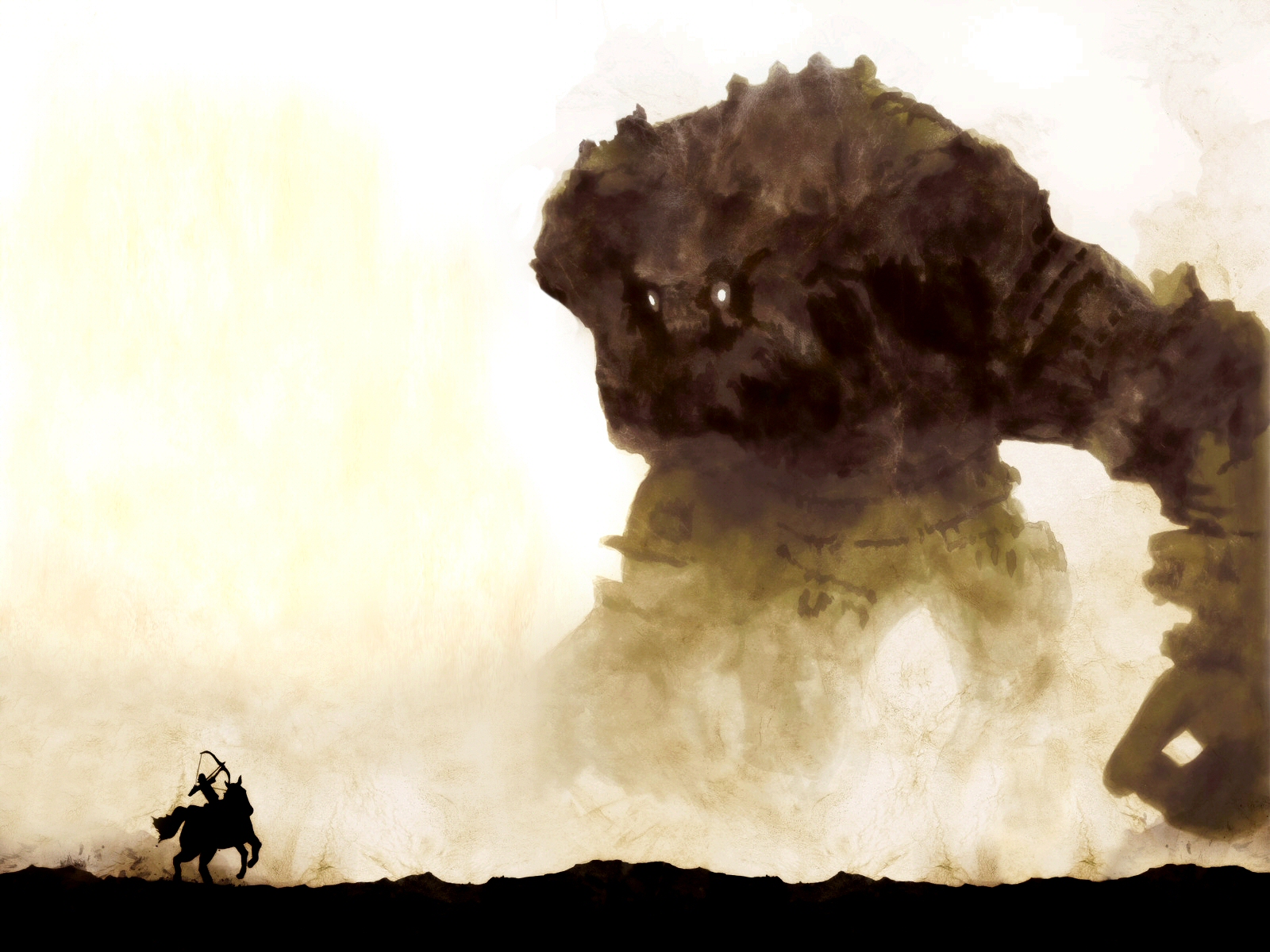 In retrospect, I'm actually not all that surprised I didn't like this
game. Given that it's basically a series of different boss fights -
and that I generally hate boss fights - then I view it as a good lesson
to not let myself always buy into the hype. I liked the sparsity of the
gameworld, and once I looked up the story, it seemed pretty cool. But I
gave up after the completion of one boss when I realized something: I hated
this game. And there is no quicker way to make me hate something than
by making me feel stupid - and not just stupid, but stupid in the sense
that I felt like the game kept expecting me to know everything I was
supposed to do and how to get there...without telling me hardly anything
of how to accomplish it. Truly, there's nothing that enrages me more
than implying something, and then becoming upset with me when I can't just figure it out on my own.
This is the first game I've rage quit in a very, very long time. And
in the process, it kind of demonstrates why I hate boss fights.
In retrospect, I'm actually not all that surprised I didn't like this
game. Given that it's basically a series of different boss fights -
and that I generally hate boss fights - then I view it as a good lesson
to not let myself always buy into the hype. I liked the sparsity of the
gameworld, and once I looked up the story, it seemed pretty cool. But I
gave up after the completion of one boss when I realized something: I hated
this game. And there is no quicker way to make me hate something than
by making me feel stupid - and not just stupid, but stupid in the sense
that I felt like the game kept expecting me to know everything I was
supposed to do and how to get there...without telling me hardly anything
of how to accomplish it. Truly, there's nothing that enrages me more
than implying something, and then becoming upset with me when I can't just figure it out on my own.
This is the first game I've rage quit in a very, very long time. And
in the process, it kind of demonstrates why I hate boss fights.
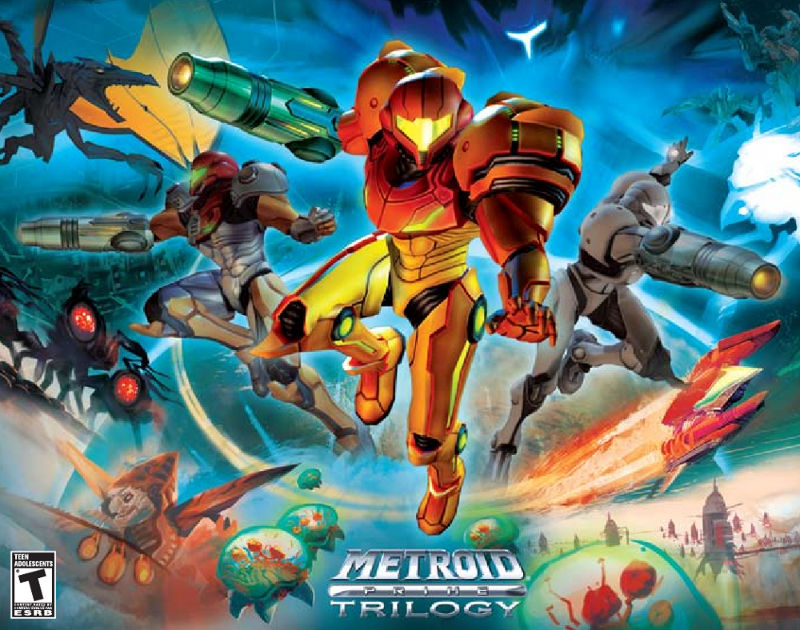 I have a hard time not returning to this one too frequently - and I
put it that way, because I have the unfortunate habit of playing games I
love into the ground, until I become a bit more tired of them than I
would like to admit. This has kind of happened with the first Metroid Prime
(even with three years since the last time I played, I can still walk
into any room in the game and tell you all the suit upgrades hidden
there and how to get them) and so it's good to take a breather. But
still, it's such a pleasure to return to them - and play through them in
succession (on the Wii, no less). Each individual gameworld and its
sense of exploration is glorious, the soundtrack is perfectly tuned to
the experience, and the stories are so beautifully conveyed through the
scanning of objects and inscriptions. Truly, one of the greatest game
collections ever compiled.
I have a hard time not returning to this one too frequently - and I
put it that way, because I have the unfortunate habit of playing games I
love into the ground, until I become a bit more tired of them than I
would like to admit. This has kind of happened with the first Metroid Prime
(even with three years since the last time I played, I can still walk
into any room in the game and tell you all the suit upgrades hidden
there and how to get them) and so it's good to take a breather. But
still, it's such a pleasure to return to them - and play through them in
succession (on the Wii, no less). Each individual gameworld and its
sense of exploration is glorious, the soundtrack is perfectly tuned to
the experience, and the stories are so beautifully conveyed through the
scanning of objects and inscriptions. Truly, one of the greatest game
collections ever compiled.
 (I'm refraining from discussion of Xenoblade Chronicles
until I actually finish the game, but needless to say, it also has a
wonderful soundtrack.) I love the platforming in this game - and the
sense of free-roam while scrambling over rooftops is a ton of fun. But
it's really the music that sealed the deal for me. While the title
theme has already become a classic, it was the variations I really
appreciated. From the Racing theme, to the cycle of different music
that plays while exploring the likes of Venice and Florence; it makes
the experience even more a joy - climbing up the side of a building,
listening to lookers-on down below express their surprise, and feeling
the swell of that subtle theme underneath perfectly express all my
emotions as I'm hurdling between buildings. This alone helps make Assassin's Creed II a great game.
(I'm refraining from discussion of Xenoblade Chronicles
until I actually finish the game, but needless to say, it also has a
wonderful soundtrack.) I love the platforming in this game - and the
sense of free-roam while scrambling over rooftops is a ton of fun. But
it's really the music that sealed the deal for me. While the title
theme has already become a classic, it was the variations I really
appreciated. From the Racing theme, to the cycle of different music
that plays while exploring the likes of Venice and Florence; it makes
the experience even more a joy - climbing up the side of a building,
listening to lookers-on down below express their surprise, and feeling
the swell of that subtle theme underneath perfectly express all my
emotions as I'm hurdling between buildings. This alone helps make Assassin's Creed II a great game.
 There's a lot to enjoy about this new IP; and the combat definitely
stands at the top. Once the player reaches the capital city of Gran
Soren, you gain the ability to switch between vocations (i.e. classes),
and that's when the combat system really starts to open up. Each
different vocation (typical base classes like fighter and mage, and
sub-classes that combine the above, like mystic knight and magic archer)
has a different set of skills, more of which become available the more
enemies you defeat. And the player has complete freedom to switch
between vocations at any time, choosing out which abilities to use, and
where to map them on your controller. When you start playing around
with them, the wealth of abilities - and openness to the gameplay -
makes the combat sections a true pleasure. Yeah, the Pawn system's
pretty cool, but I haven't had so much fun killing things since Kingdoms of Amalur.
There's a lot to enjoy about this new IP; and the combat definitely
stands at the top. Once the player reaches the capital city of Gran
Soren, you gain the ability to switch between vocations (i.e. classes),
and that's when the combat system really starts to open up. Each
different vocation (typical base classes like fighter and mage, and
sub-classes that combine the above, like mystic knight and magic archer)
has a different set of skills, more of which become available the more
enemies you defeat. And the player has complete freedom to switch
between vocations at any time, choosing out which abilities to use, and
where to map them on your controller. When you start playing around
with them, the wealth of abilities - and openness to the gameplay -
makes the combat sections a true pleasure. Yeah, the Pawn system's
pretty cool, but I haven't had so much fun killing things since Kingdoms of Amalur.
 I don't even know where to start with this one. Protagonists Serah
and Noel begin traveling the timeline; they begin jumping between time
streams to alternate timelines while ending paradoxes to restore the
"true" timeline, then at some point there's a diversion to a mechanical
tower where there are alternate versions of the antagonist Caius and his
companion Yeul? And then Yeul is...some kind of oracle that's re-born
every generation? And Caius wants to destroy time so that she'll stop
dying? And there are multiple versions of Yeul? And then Serah dies at
the end before a "To be Continued"? Ack. I'm so confused.
I don't even know where to start with this one. Protagonists Serah
and Noel begin traveling the timeline; they begin jumping between time
streams to alternate timelines while ending paradoxes to restore the
"true" timeline, then at some point there's a diversion to a mechanical
tower where there are alternate versions of the antagonist Caius and his
companion Yeul? And then Yeul is...some kind of oracle that's re-born
every generation? And Caius wants to destroy time so that she'll stop
dying? And there are multiple versions of Yeul? And then Serah dies at
the end before a "To be Continued"? Ack. I'm so confused.
 My first sitting of Iron Man 3, I didn't really love it; or
like it, even. I don't know what I was expecting. But I was kind of,
meh. (And annoyed at Hollywood's continued presentations of "ugly"
people vs "pretty" people.) But circumstances took me back a second
time, and wow, did I like it a whole lot more. I love the idea of
taking Tony away from everyone and everything; I love that there are
repercussions from the attack on New York; I even love the Mandarin
twist, and the social commentary it brings. Plus, the battle with all
the Iron Man suits at the end is just so darn fun. I'm glad I took the
effort to see it again - it's a good reminder that my perceptions of a
story can change, and even a second viewing can be a different
experience.
My first sitting of Iron Man 3, I didn't really love it; or
like it, even. I don't know what I was expecting. But I was kind of,
meh. (And annoyed at Hollywood's continued presentations of "ugly"
people vs "pretty" people.) But circumstances took me back a second
time, and wow, did I like it a whole lot more. I love the idea of
taking Tony away from everyone and everything; I love that there are
repercussions from the attack on New York; I even love the Mandarin
twist, and the social commentary it brings. Plus, the battle with all
the Iron Man suits at the end is just so darn fun. I'm glad I took the
effort to see it again - it's a good reminder that my perceptions of a
story can change, and even a second viewing can be a different
experience.
 Early in the year, I gave The Walking Dead a try, and did my
best to catch up (all the while the second half of third season
aired). I sincerely enjoyed the series - for its pacing, for its
ruminations, for its themes, and for its clear interest in the
deterioration of humanity over the zombies themselves. But when I sat
through it all again with my sister as she tried to catch up for fourth
season, I found it overall less compelling. It's good one time around,
but when you know where everything's going and ends up, then the pacing
really starts to drag.
Early in the year, I gave The Walking Dead a try, and did my
best to catch up (all the while the second half of third season
aired). I sincerely enjoyed the series - for its pacing, for its
ruminations, for its themes, and for its clear interest in the
deterioration of humanity over the zombies themselves. But when I sat
through it all again with my sister as she tried to catch up for fourth
season, I found it overall less compelling. It's good one time around,
but when you know where everything's going and ends up, then the pacing
really starts to drag.
 I don't know what's worse: that this really isn't a Star Trek
film at all, that this isn't even a science fiction film at all, or the
irony of the fact that there were clear attempts at fan-service in
recreating classic moments from Wrath of Khan that wound up alienating the majority of Trek's fanbase. JJ Abrams has absolutely no idea whatsoever what makes Wrath of Khan a great film. Which is because he probably doesn't really like it (and Star Trek in general) near as much as he claims.
I don't know what's worse: that this really isn't a Star Trek
film at all, that this isn't even a science fiction film at all, or the
irony of the fact that there were clear attempts at fan-service in
recreating classic moments from Wrath of Khan that wound up alienating the majority of Trek's fanbase. JJ Abrams has absolutely no idea whatsoever what makes Wrath of Khan a great film. Which is because he probably doesn't really like it (and Star Trek in general) near as much as he claims.
 Thank goodness Crystal Dynamics finally decided to turn Lara Croft
into a human being. No, she's not perfect - but she's so much better
than she was. There was a bit too much of her upset and crying (which I
chalk up to our combined depictions of women heroes as constantly being
emotional, while not letting any of our men heroes show hardly any
emotion at all - two sides of damaging gender roles). But there's no
denying - between Rhianna Pratchett's writing, and Camilla Luddington's
voice acting, Lara Croft has never been better. And she's headed in a
really interesting direction.
Thank goodness Crystal Dynamics finally decided to turn Lara Croft
into a human being. No, she's not perfect - but she's so much better
than she was. There was a bit too much of her upset and crying (which I
chalk up to our combined depictions of women heroes as constantly being
emotional, while not letting any of our men heroes show hardly any
emotion at all - two sides of damaging gender roles). But there's no
denying - between Rhianna Pratchett's writing, and Camilla Luddington's
voice acting, Lara Croft has never been better. And she's headed in a
really interesting direction.
 There's a lot I enjoyed about BioShock Infinite; the
stunning graphics and setting, the interplay between Booker and
Elizabeth, and the commentaries on American Exceptionalism, religion,
and what to do when two warring factions are both equally terrible. But
the ending was about as confusing as the latter seasons of Lost
(which also - perhaps not un-coincidentally - involved time travel).
I'm all for innovation, and I don't necessarily think that it was
terrible. At the same time, I wish the game had given me something
definitive. Speculation from the audience should come in the middle of
the story, not after the end.
There's a lot I enjoyed about BioShock Infinite; the
stunning graphics and setting, the interplay between Booker and
Elizabeth, and the commentaries on American Exceptionalism, religion,
and what to do when two warring factions are both equally terrible. But
the ending was about as confusing as the latter seasons of Lost
(which also - perhaps not un-coincidentally - involved time travel).
I'm all for innovation, and I don't necessarily think that it was
terrible. At the same time, I wish the game had given me something
definitive. Speculation from the audience should come in the middle of
the story, not after the end.
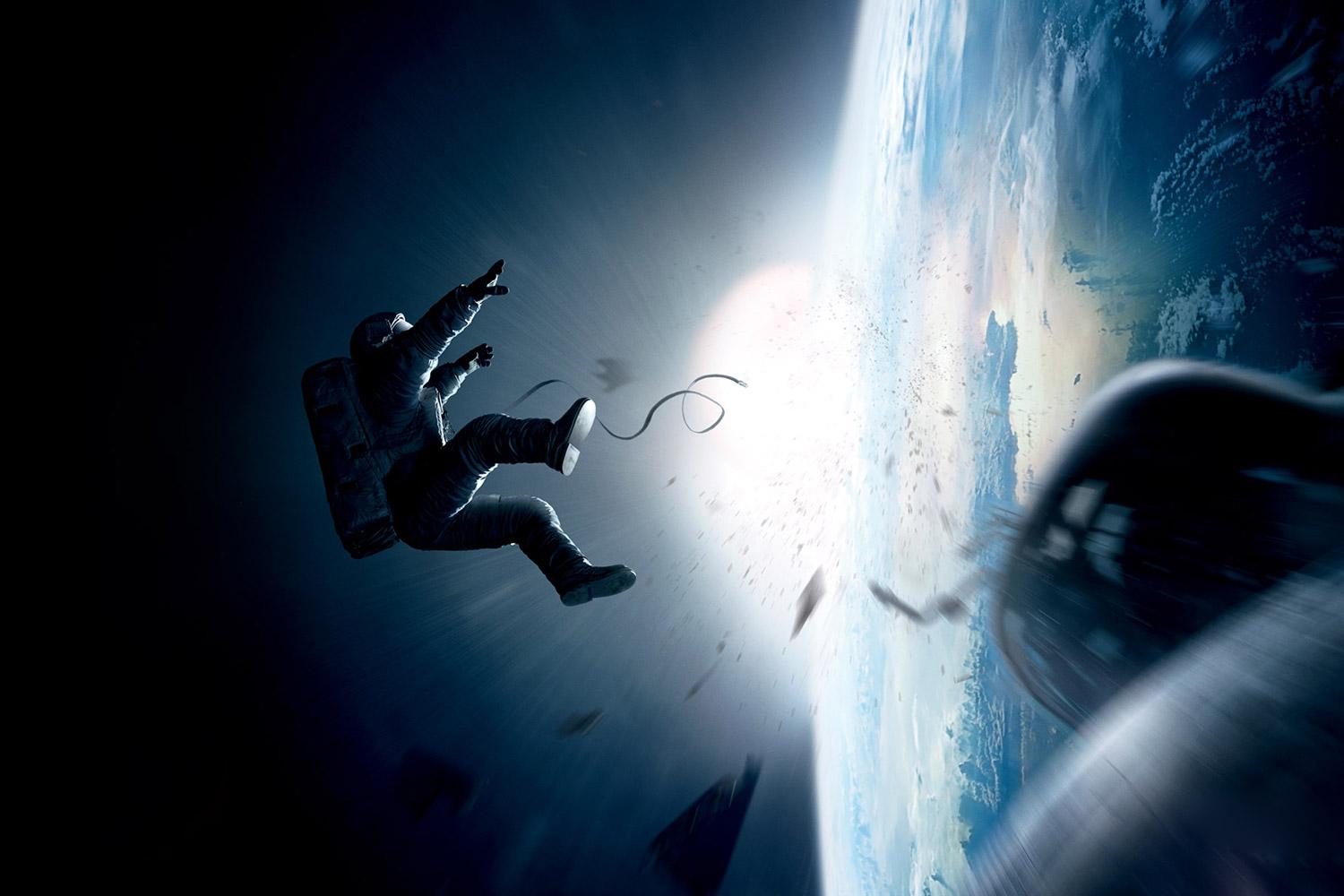 If you haven't seen this film yet, then get thee to a movie theatre! In all my years of theatre-loving with the likes of Star Wars, Lord of the Rings, and Harry Potter (among others) I have never seen another film that demands
more the big-screen experience. While the film is exceptional and
brilliantly made, no way will it have the same impact on the small
screen. This disturbingly plausible depiction of survival in outer
space is wrenching and thrilling, and there's nothing like feeling like
you're right there with Ryan, watching the destruction of the ISS, or
floating out toward nothing with no hope of stopping. Give to Alfonso
Cuaron and Sandra Bullock all of the awards, please.
If you haven't seen this film yet, then get thee to a movie theatre! In all my years of theatre-loving with the likes of Star Wars, Lord of the Rings, and Harry Potter (among others) I have never seen another film that demands
more the big-screen experience. While the film is exceptional and
brilliantly made, no way will it have the same impact on the small
screen. This disturbingly plausible depiction of survival in outer
space is wrenching and thrilling, and there's nothing like feeling like
you're right there with Ryan, watching the destruction of the ISS, or
floating out toward nothing with no hope of stopping. Give to Alfonso
Cuaron and Sandra Bullock all of the awards, please.
 From a game most notorious for its difficultly, it's the setting that
really won me over. What's more, I really enjoyed the way that
difficulty and sense of exploration worked in tandem. Combine the
thrill of finding out what's around the next corner, with the very real
possibility of encountering something that could kill you with one hit,
and it makes for a very tense and engaging experience. Especially given
just how well the environments are built. (Except for Valley of
Defilement - which is just wandering aimlessly in the dark.) The
Boletarian Palace alone is to die for (pun intended).
From a game most notorious for its difficultly, it's the setting that
really won me over. What's more, I really enjoyed the way that
difficulty and sense of exploration worked in tandem. Combine the
thrill of finding out what's around the next corner, with the very real
possibility of encountering something that could kill you with one hit,
and it makes for a very tense and engaging experience. Especially given
just how well the environments are built. (Except for Valley of
Defilement - which is just wandering aimlessly in the dark.) The
Boletarian Palace alone is to die for (pun intended).
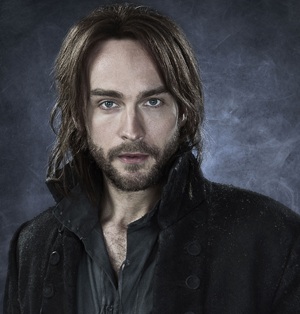 What is it with British men named Tom? On a show that really
shouldn't work (really, really shouldn't work) that manages to function
incredibly well on the shoulders of a very absurd premise, Crane has
risen above as the best new character of the fall season. In a change
from Irving's original wilting and superstitious school teacher, Crane
is fastidious and proper, all the while bold, intelligent, and very,
very capable. What's more, the show milks a ton of humor and drama out
of his adjusting to life in the 21st century. And it succeeds based on
his character (and resulting relationship with Abbie) alone.
What is it with British men named Tom? On a show that really
shouldn't work (really, really shouldn't work) that manages to function
incredibly well on the shoulders of a very absurd premise, Crane has
risen above as the best new character of the fall season. In a change
from Irving's original wilting and superstitious school teacher, Crane
is fastidious and proper, all the while bold, intelligent, and very,
very capable. What's more, the show milks a ton of humor and drama out
of his adjusting to life in the 21st century. And it succeeds based on
his character (and resulting relationship with Abbie) alone.
 Do I really need to explain this one? I'll just leave this picture
here and let anyone who reads this contemplate the awesomeness that is
Tom Hiddleston as Loki Laufeyson, while I get back to trying to convince
my sister to let me buy a cardboard cutout for the living room.
Do I really need to explain this one? I'll just leave this picture
here and let anyone who reads this contemplate the awesomeness that is
Tom Hiddleston as Loki Laufeyson, while I get back to trying to convince
my sister to let me buy a cardboard cutout for the living room.
 This game has lovely graphics, an aptly composed soundtrack, and a
decent story. But oh my, is the gameplay eyebleed-inducing. It's even
worse than The Walking Dead (walk around in a confined circle
until you find the prompt for the correct item) because it's not just
QTEs - it's QTEs on steroids. All it really shows is that the
mundanities of life don't make for interesting gameplay. And that the
success of a repeated task that boils down to the nature of one's
reflexes is the opposite of an interesting or legitimate challenge.
This game has lovely graphics, an aptly composed soundtrack, and a
decent story. But oh my, is the gameplay eyebleed-inducing. It's even
worse than The Walking Dead (walk around in a confined circle
until you find the prompt for the correct item) because it's not just
QTEs - it's QTEs on steroids. All it really shows is that the
mundanities of life don't make for interesting gameplay. And that the
success of a repeated task that boils down to the nature of one's
reflexes is the opposite of an interesting or legitimate challenge.